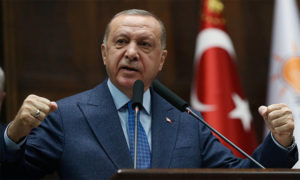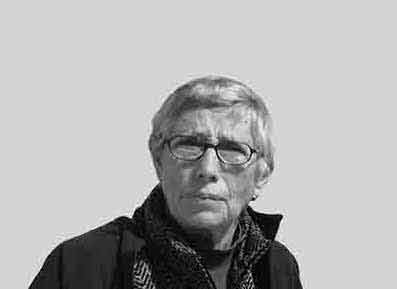 gulftoday.ae
gulftoday.ae
Recep Tayyip Erdogan

Michael Jansen
The author, a well-respected observer of Middle East affairs, has three books on the Arab-Israeli conflict.
He believed Greece would be unable to stem a mass flow of migrants across the border. Athens disappointed him by using tear gas, water cannon, and rubber bullets to repel those trying to enter Greece by land and returning to Turkey those who landed on nearby Greek islands on rubber rafts.
On February 28, Ankara declared it would no longer prevent migrants from crossing into the European Union. They were encouraged to go to the border by false reports that the Greek entry gates were open and, the New York Times reported, at least on one occasion forced to exit a bus near the border by armed Turkish police and frontier guards. Turkish police have also fired tear gas at Greek counterparts who were preventing mass crossings.
To create international sympathy for the migrants, the Turks have also directed media to report on Syrian refugee families whose stories have been widely covered by satellite television channels and newspapers. These Syrians have been long-term residents of Turkey and are not from Syria’s Idlib province where at least 900,000 have been displaced by fighting since December. Ankara does not permit Idlib inhabitants to enter Turkey.
The majority of migrants deliberately corralled for Turkey’s border operation have been Afghan, Iranian, Moroccan, Pakistani, and African men seeking “a better life” in Europe. Migrants from these countries and others who have submitted applications for asylum in Turkey have exceeded half a million since 2011 while Syrian refugees temporarily hosted by Turkey since the war began are estimated to number 3.6 million.
Erdogan initially welcomed Syrians escaping the war in their homeland.
He even offered to naturalise some who had set up successful enterprises in Turkey. But, over the years Syrians have become highly unpopular with Turks and a political liability for Erdogan and his Justice and Development Party (AKP).
Erdogan’s political and military intervention in Syria has also become unpopular, particularly because it has been unsuccessful. In mid-2011 he recruited defected Syrian soldiers into his “Free Syrian Army” (FSA) to oust the Syrian government by force and formed the expatriate, Muslim Brotherhood-dominated Syrian National Council to replace it. Erdogan has not given up on this pipe dream although Syria’s government remains in power, controls 70 per cent of the country, and rules 85 per cent of Syrians still in the country.
His “Plan B” was to try seizing control of Idlib by distorting and exploiting the 2018 Russian-Turkish agreement to declare an Idlib ceasefire and promote de-confliction efforts. He did this by strengthening al-Qaeda-affiliated and other anti-government armed groups based there and planting a dozen well fortified and heavily manned Turkish military bases in and around the province.
Turkey was meant to rein in al-Qaeda’s Ha’yat Tahrir al-Sham, impose a buffer zone around Idlib to prevent clashes with the Syrian army, open two main highways crossing Idlib, and set up observation posts in Idlib to ensure that the terms of the deal were honoured. The object of the agreement had been to postpone a Syrian army offensive in Idlib which would send a flood of refugees to the Turkish border.
Moscow and its ally, Damascus, tolerated Turkey’s violations of the accord until last December when they mounted their delayed campaign to regain control of the Damascus-Hama-Aleppo highway (M5) and the Aleppo-Latakia route (M4).
Although Turkey reinforced its bases in Idlib and deployed shoulder-fired-anti-aircraft missiles and drones, Russia retained control of the skies over Idlib and the Syrian army advanced, achieving its initial objectives.
Having lost ground, Erdogan demanded that the Syrian army withdraw to the edge of the Idlib de-confliction zone but was rebuffed by Russian President Vladimir Putin. He made Erdogan settle for a ceasefire with forces in place along front lines and the opening of both highways. This amounted to a major climbdown for Erdogan who responded by launching the migrant crisis on the border with Greece.
It is significant that the migrants were directed by neo-Ottoman Erdogan to the Greek frontier rather than the Bulgarian border with Turkey. Athens has been a Turkish antagonist since Greece launched its war of independence from the Ottoman Empire in 1821. The Greeks were backed in this campaign by Russia as well as France and Britain. Turkish enmity deepened when Greece invaded Anatolia in 1919 with the aim of establishing control of Greek inhabited areas in the collapsing Ottoman Empire while France and Britain carved up its Arab possessions.
Erdogan’s migrant and Idlib reverses coincided with the proclamation by former colleague and Deputy Prime Minister Ali Babacan that he is forming a new party, dubbed “Deva,” the Turkish for “Remedy,” to promote freedom of expression, upgrade the education system, and return to the presidential model of governance. Babacan is the second resigned member of the AKP to establish a political party. Last year former Prime Minister Ahmet Davutoglu formed his Future Party. Both seek to win over voters opposed to Erdogan’s autocratic rule in order to end Erdogan’s disastrous domestic policies and external adventurism in Syria and, lately, Libya and return Turkey to democracy. Erdogan is highly vulnerable, particularly to challenges from former AKP colleagues. Erdogan received a major shock when the party lost the 2019 municipal elections in major cities, including Istanbul, Ankara, Adana, and Izmir. A desperate man, he is likely to launch fresh ill-considered destructive adventures which weaken rather than strengthen his grip on power.



